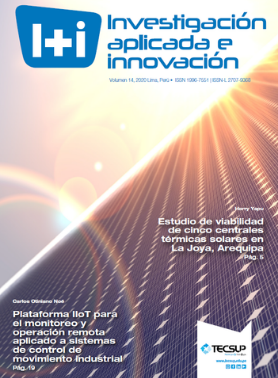Economic Impact of 3D Printers. The 4th. Industrial Revolution?
DOI:
https://doi.org/10.71701/zay30850Keywords:
3D printer, trend, industry 4.0, additive manufacturing, Maker, Fab Lab, Smart FactoryAbstract
In Peru, imports of 3D printers have increased in the last 3 years, having an accelerated growth of 304.8 % in 2019 compared to 2018 and by the end of 2020, a growth is estimated to be higher than 2019. This is due in July 2020, imports grew to 98.6 % compared to those of the previous year. Most of the surveyed companies began their 3D printing services activities since 2019, manufacturing products such as facemasks, respirator attachments, auto parts, ornaments and prototypes in general. Educational institutions surveyed, currently have a variety of 3D printing equipment for academic, research and innovation purposes, in addition to providing services, at a smaller scale, to the industry and those equipment ́s rentals. 3D printing generates an economic impact in Peru which is evidenced by the breadth of uses and the exponential growth of its imports in recent years, which leads us to relate the 4th industrial revolution with the growth of the 3D industry and the breadth of uses in various economic sectors.
Downloads
References
3d Printing Industry. (2020). Recuperado de https://3dprintingindustry.com/3d-printing-basics-free-beginners-guide
Alicia M. (5 de marzo de 2020). 3d Natives. Recuperado de https://www.3dnatives.com/es/mercado-de-impresion-3d-de-polimeros-generara-este-2020-050320202/#!
Álvarez, L. H. (2014). Atos SE (Societas Europaea). (3D printing) Recuperado de https://atos.net/content/dam/global/ascent-whitepapers/ascent-whitepaper-3d-printing.pdf
Arandes, J. M., Bilbao, J., & Lopez Valerio, D. (2004). Reciclado de residuos plásticos. Revista Iberoamericana de Polímeros. Recuperdado de http://www.ehu.eus/reviberpol/pdf/MAR04/Danilo2004.pdf
Autodesk. (s.f.). Autodesk. Recuperado de https://latinoamerica.autodesk.com/solutions/3d-printing
Basco, A. I., Beliz, G., Coatz, D., & Garnero, P. (2018). Industria 4.0: Fabricando el Futuro.
Beltagui, A., Kunz, N., & & Gold, S. (2019). The role of 3D printing and open design on adoption of socially susta inable supply chain innovation. . International Journal of Production Economics. Obtenido de (Beltagui, A., Kunz, N., & Gold, S. 2019)
BP, S. (1989). Biomedícal revíew articles: what editors want from authors and peer reviewers. Can Med Assoc J.
Brettel, M., Friederichsen, N., & Michael Keller, M. R. (s.f.). How Virtualization, Decentralization and Network Building Change the Manufacturing Landscape: An Industry 4.0 Perspective. “World Academy of Science, Engineering and Technology. International Journal of Information and Communication Engineering”. Recuperado de https://formamente.guideassociation.org/wp-content/uploads/2017_1_03_Brettel.pdf
Camós, G., Bertossi, F., & Santos Arias, F. (20 de abril de 2020). BID. Recuperado de https://blogs.iadb.org/transporte/es/el-potencial-de-la-impresion-3d-en-el-sector-transporte/
Cender Quispe, J., Paulo Vela, A., Moises Meza, R., & Victor Moquillaza, A. (2020). COVID-19: A pandemic in the era of digital health. Scielo.
Cheng Barrantes, O. E., & Rojas Vega, L. F. (2019). Universidad de Piura. Recuperado de https://pirhua.udep.edu.pe/handle/11042/4024
Conde, J. E. (2016). Centro de Análisis y Prospectiva. (Nota de Futuro Impresoras 3D) Recuperado de https://intranet.bibliotecasgc.bage.es/intranet-tmpl/prog/local_repository/documents/17854.pdf
Ecerra Cano, S., Covarrubias Miranda, J. R., & Tinoco Trujillo, F. (2019). EAE. Recuperado de http://eae.xebook.es/xmlui/handle/123456789/1666
FabLabs.io. (2020). FabLabs. Recuperado de https://www.fablabs.io/labs?utf8=%E2%9C%93&q%5Bcountry_code_eq%5D=pe&q%5Bactivity_status_eq%5D=&per=25&commit=Filter
FILAMENT2PRINT. (3 de mayo de 2019). Recuperado de https://filament2print.com/es/blog/61_profesiones-sectores-mas-uso-impresion-3d.html
Gillham, B. (2008). Developing a questionnaire. . London: Continuum International Publishing Group Ltd.
Gonzales, V. (s.f.). Muy Interesante. Recuperado de https://www.muyinteresante.es/tecnologia/articulo/que-hacemos-con-los-residuos-de-las-impresoras-3d-231487753280
Grand View Research. (Febrero de 2020). Recuperado de https://www.grandviewresearch.com/pressrelease/global-3d-printing-market
Hamidreza Ghaffar, S., Corker, J., & Fan, M. (2018). Additive manufacturing technology and its implementation in construction as an eco-innovative solution. ScienceDirect.
Heiner Lasi, P. F.-G., & Hoffmann, M. (2014). Industry 4.0. Bus Inf Syst Eng. Recuperado de https://link. springer.com/article/10.1007/s12599-014-0334-4
Hernández Alonso, J., & López Morán, L. (2019). Estadística descriptiva, Teoría y Ejercicios. Madrid: Sanz y Torres.
Karevska, S., & Steinberg, G. (2019). 3D printing: hype or game changer? A Global EY Reporte.
Ledger, G. (11 de Febrero de 2019). América Economía. Recuperado de https://www.americaeconomia.com/negocios-industrias/impresion-3d-la-cuarta-revolucion-industrial-de-los-makers
Perasso, V. (12 de octubre de 2016). BBC News. Recuperado de https://www.bbc.com/mundo/noticias-37631834
Pumacayo Cárdenas, S., Arias Vela, G., & Quea Pinto, E. (2020). Impresión 3D de rara patología congénita de aorta y vasos supraaórticos. ScienceDirect.
Ramírez Collado, V., Puchades Valencia, J., Martín Rodríguez, J., & Muñoz Montes, J. (27 de Febrero de 2018). Universidad Politécnica de Valencia. Recuperado de http://hdl.handle.net/10251/112873
Stratasys. (2018). Manufacturing the Future Globalization with 3D Printing. USA: Manufacturing.
Downloads
Published
Issue
Section
License

This work is licensed under a Creative Commons Attribution-NonCommercial 4.0 International License.


